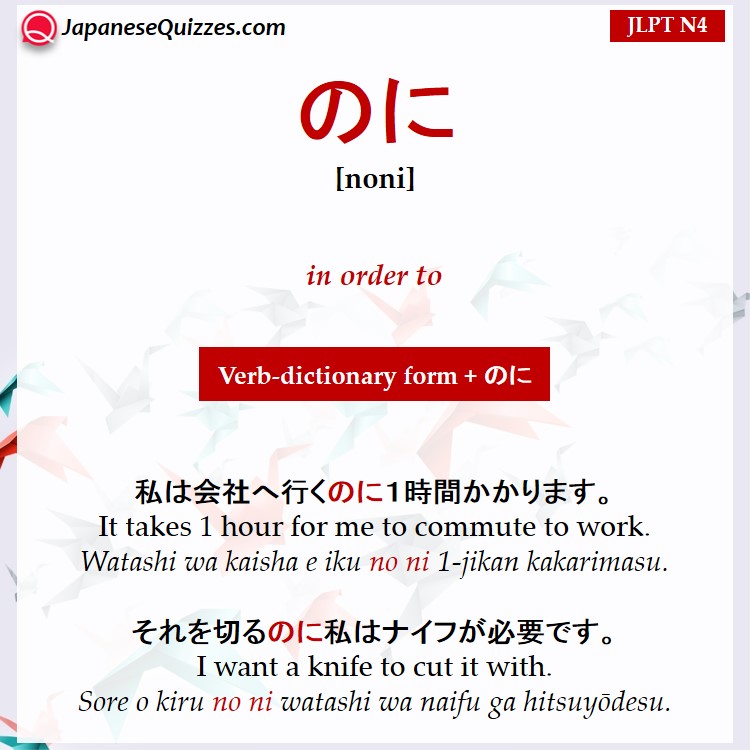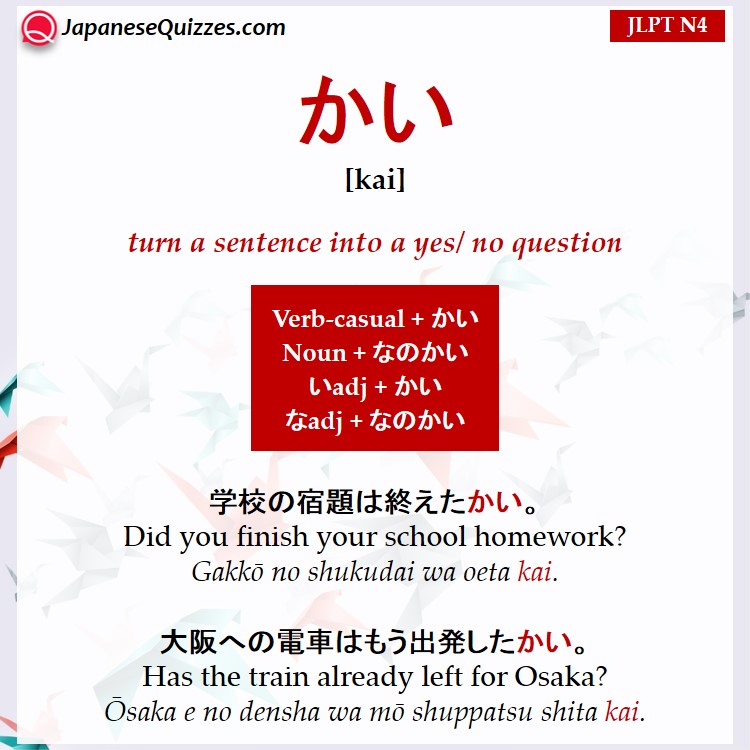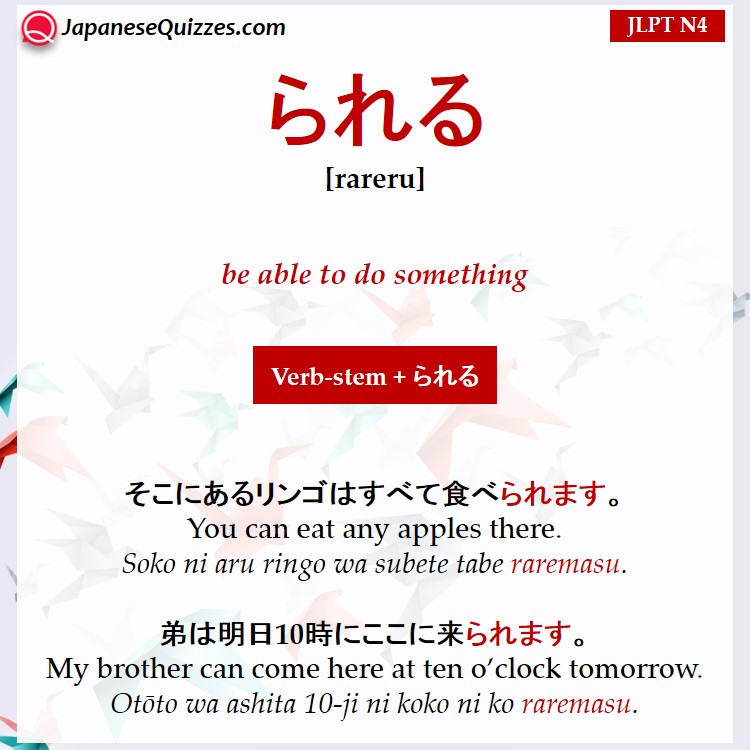

Formations
もらう/いただく
Examples
私は友達からハガキをもらいました。
Watashi wa tomodachi kara hagaki o moraimashita.
I received a postcard from my friend.
サラさんはクラスメートからラブレターをもらった。
Sara san wa kurasumeet kara labu retaa o moratta.
Sarah received a love letter from her classmate.
ロビンは大学から奨学金をもらいました。
Robin wa daigaku kara syougakukin o moraimashita.
Robin received the scholarship from the university.
小川さんは会社からお金をもらった。
Ogawa san wa kaisya kara okane o moratta.
Mr.Ogawa received some money from the company.
私はマネージャーの奥さんからパリのお土産をいただいた。
Watashi wa maneejaa no okusan kara pari no omiyage o itadaita.
I received a souvenir from the manager’s wife.
私は和子さんのお母さんからなしをいただいた。
Watashi wa kazuko san no okaasann kara nashi o itadaita.
I received some pears from Kazuko’s mother.
See also

 Formations
Formations
Both mean “to be late”. However you can use “chikoku suru” only when you are late for a conference, a meeting, and school, etc..
Examples
私は仕事に遅れる。
Watashi wa shigoto ni okureru.
I’m late for work.
トムが遅刻している。
Tomu ga chikoku shite iru.
Tom is late.
エリーはほとんど遅刻しない。
Erī wa hotondo chikoku shinai.
Ellie is almost never late.
彼は会社に遅刻しました。
Kare wa kaisha ni chikoku shimashita.
He was late for work.
電車が遅れているようです。
Densha ga okurete iru yōdesu.
The train seems to be late.
私は仕事に30分遅れるだろう。
Watashi wa shigoto ni sanjyuppun okurerudarou.
I’ll be 30 minutes late for work.
See also

is visible, to be able to see
(potential form) to be able to watch
 Formations
Formations
見える: indicates that a certain object comes into one’s sight.
見られる : indicate that one’s intention of seeing can be realized.
Examples
私は部屋の窓から海が見えます。
Watashi wa heya no mado kara umi ga miemasu.
I can see the ocean from the window of the room.
私はここから富士山が見える。
Watashi wa koko kara fujisan ga mieru.
I can see Mt. Fuji from here.
私の職場からパン屋が見える。
Watashi no shokuba kara pan-ya ga mieru.
I can see a bakery from my office.
その動物園では珍しい動物が見られる。
Sono dōbu~tsuende wa mezurashī dōbutsu ga mi rareru.
You can watch rare animals at that zoo.
家に早く帰れば、あなたは6時からのニュースを見られる。
Ie ni hayaku kaereba, anata wa 6-ji kara no nyūsu o mirareru.
If you return home early, you can watch the news from 6 o’clock.
どこであの映画が見られますか。
Doko de ano eiga ga mi raremasu ka.
Where can I watch that movie?
See also

to be able to hear/to listen
 Formations
Formations
聞こえる [きこえる]: INTRANSITIVE
(1) to be heard; to be audible;
(2) to be said to be; to be reputed
聞く [きく]: TRANSITIVE
(1) to hear; to listen; (2) to ask
Examples
隣の部屋で電話がなっているのが私には聞こえる。
Tonari no heya de denwa ga natte iru no ga watashini wa kikoeru.
I can hear the telephone ringing in the next room.
ここから私たちには海の音が聞こえます。
Koko kara watashi-tachi ni wa umi no oto ga kikoemasu.
We can hear the ocean from here.
猫が窓を引っかいているのが私には聞こえる。
Neko ga mado o hikkaite iru no ga watashini wa kikoeru.
I can hear a cat scratching at the window.
電車で音楽を私は聞きます。
Densha de ongaku o watashi wa kikimasu.
I listen to music on the train.
今日の午後、私はその講演を聞く。
Kyou no gogo, watashi wa sono kouen o kiku.
I will listen to that lecture this afternoon.
明日、私は部下の提案を聞く。
Ashita, watashi wa buka no teian o kiku.
I will listen to my subordinates’ suggestions tomorrow.
See also

the act of willing, choosing, or resolving; exercise of willing.
The volitional form of a verb is a less formal, more casual equivalent of ましょう.
 Formations
Formations
You can use it to suggest a plan to a close friend, for example.
ru-verbs: Drop the final –ru and add –yoo Ex: 食べる -> 食べよう
u-verbs: Drop the final –u and add ?oo Ex: 行く -> 行こう, 話す -> 話そう
Examples
近いうちに会おう。
Chikaiuchini aou.
Let’s meet again soon.
その機会があることを祈ろう。
So no kikai ga aru koto o inorou.
Let’s hope you get that chance.
今から散歩しよう。
Ima kara sanpo shiyou.
I’ll take a walk now.
今日は何もしないでいよう。
Kyō wa nani mo shinaide iyou.
Let’s not do anything today.
大会に出ようと決めました。
Taikai ni deyou to kimemashita.
I decided to participate in the competition.
図書館に行こうと思ってる。
Toshokan ni ikou to omotteru.
I’ve been thinking of going to the library.
もっと明るい話をしよう。
Motto akarui hanashi o shiyou.
Let’s talk about something more cheerful.
あなたが提案した価格で取引しよう。
Anata ga teian shita kakaku de torihiki shiyou.
Let’s make a deal at the price you’ve suggested.
See also

 Formations
Formations
全然 + Verb-casual
全然 + adj
Examples
私は全然疲れていません。
Watashi wa zenzen tsukarete imasen.
I’m not tired at all.
彼女は政治については全然興味がない。
Kanojo wa seiji ni tsuite wa zenzen kyōmi ga nai.
She has no interest in politics.
この本は全然面白くありません。
Kono hon wa zenzen omoshiroku arimasen.
This book isn’t interesting at all.
この家は住み心地が全然よくない。
Kono ie wa sumigokochi ga zenzen yokunai.
This house is anything but comfortable to live in.
今夜、私は全然勉強する気にならない。
Kon’ya, watashi wa zenzen benkyō suru ki ni naranai.
I don’t feel like studying at all tonight.
私はこの問題に対する解決策が全然思いつかない。
Watashi wa kono mondai ni taisuru kaiketsusaku ga zenzen omoitsukanai.
I can’t think of any solution to this problem.
See also













































